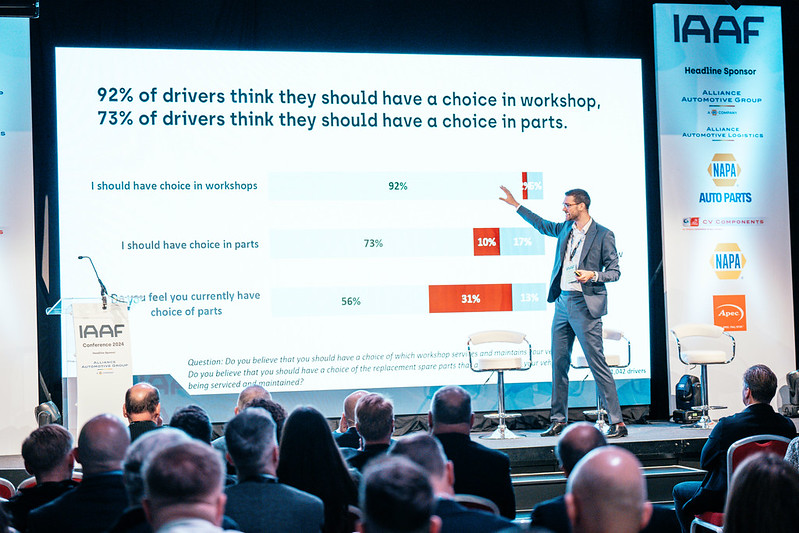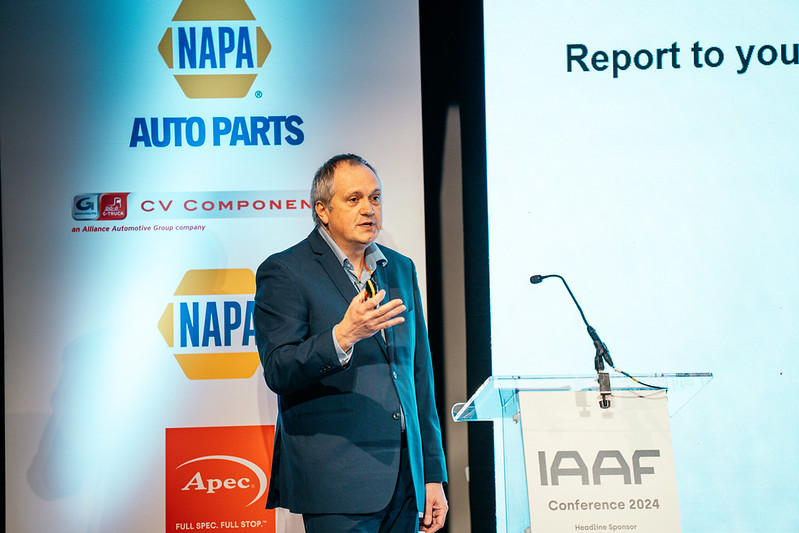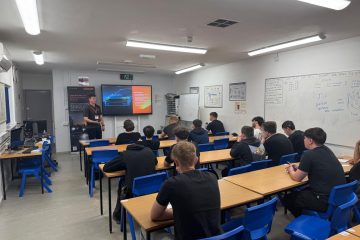With the year coming to a close, the IAAF Conference sought to highlight the benefits of leadership in the industry, while also encouraging collaboration to take advantage of the opportunities presented. Auto Repair Focus Editor Phil Curry was in attendance.
The 2024 IAAF Conference sought to invite the automotive aftermarket to embrace the ‘Everyday Leader’, with a range of presentations and discussions highlighting various forms of leadership across the aftermarket.
Discussions included legislative changes, technological advances and key industry challenges and opportunities. Host Stephen Whitton keep the event flowing as various industry experts shared their views.

Kicking off proceedings at the IAAF Conference, chief executive Mark Field welcomed attendees and expressed his gratitude, highlighting the year-long unity of the aftermarket industry.
Field shared insights from the popular ‘Carpool Aftermarket’ initiative, where he interviewed key industry figures in an informal, engaging format. “What is your passion? That is what drives you and the industry forward,” Field said, emphasising the ongoing need for innovation and collective efforts to meet future challenges.
Right to Repair
Following Field’s opening of the IAAF Conference, Quentin Le Hetet, from GiPA, presented the findings of a comprehensive consumer survey undertaken by the aftermarket industry association. Conducted with 1,042 UK drivers, the survey revealed significant consumer demand for choice in service and repair.
The results of the survey showed that 96% of drivers will go to a workshop to have their cars repaired and serviced. This was broken down, with 65% saying they would always visit a garage, while 23% did basic maintenance themselves, and 8% suggesting they do most maintenance tasks.
“Those doing most of the maintenance themselves, it is most likely the simplest form of maintenance,” commented Le Hetet. “This is becoming less simple as car technology becomes increasingly more complex.”
When asked where they take their cars for servicing and repair, 72% said they went outside the franchised dealer networks, with 60% choosing a local independent workshop. With the number of 0-4-year-old cars in the UK set to decrease in the coming years, this figure could increase further, as more of the car parc has no ties with dealerships.

The next question asked if they believe they should have a choice of which workshop services and maintains their vehicles, 92% agreed they should. The same question about choice in parts saw 73% say yes to having choice.
“Because you have got less percentage of drivers who say that they should have the choice of parts, and the ones who do not say yes are doing so because they have no idea what part they should use,” Le Hetet explained to the IAAF Conference audience. “And this is why, for them, the choice in workshop is the most important, because they select the workshop, trusting them, for them to select the parts, and to advise them on the parts. So that advising role is very important, and it is reflected in the percentages that you see.”
Price is important
Another important question focused on which factor would most influence their choice in spare parts, 35% chose quality and durability, while 34% highlighted price as a decision-maker. Recommendation from a professional accounted for 14% of responses, while brand reputation and manufacturer-approval both saw 8%.
“Price and quality requirements can also change slightly according to the age of the car,” added Le Hetet. “Those drivers who have older vehicles are more price sensitive, and those with younger cars find the quality of parts more appealing. These are two factors to keep in mind.”
When discussing whether the government should update legislation to support the right to choose between repairers, 82% agreed it should, in an effort to ensure choice and lower running costs. Only 6% disagreed with the statement. Of those in favour of legislation, 42% believed directly that legislation should help to lower maintenance and repair costs. Then, 25% believed it should allow for greater choice and convenience, and 16% chose the ability to support local businesses as the most important reason.
Panel nails it
Following Le Hetet’s presentation at the IAAF Conference was a panel discussion where he was joined by Field, and Neil Pattemore, IAAF’s Technical Director. Together, they explored the steps needed to elevate the aftermarket’s image. Pattemore stressed the importance of educating both consumers and the government about the value of independent services. “We need to raise our profile, so consumers understand the quality and choice they have outside of OEM networks,” he said.
“The consumer does not understand the nuances that exist within the aftermarket,” he added. “The Office of National Statistics carried out their annual business report recently, which valued the UK aftermarket at over £56 billion. The entire automotive industry, including vehicle production and so on, is valued at around £92 billion. So that £56 billion represents well over 60% of the total UK automotive sector. And I think that message needs to be very clearly put on the desk of the government generally.
“Ultimately, I think we are the hidden engine of the automotive industry and ultimately keep mobility affordable. If you look at what happened during COVID-19, we kept cars on the road when most of the main dealers were closing. So, we are an important sector, and we can show that,” he concluded.
Keeping skills
Simon Albert, Managing Director of Messe Frankfurt UK, then took to the IAAF Conference stage to lead a discussion on Automechanika Birmingham’s new ‘Motorvate’ initiative, introduced to address the growing skills gap in the automotive sector.

Albert called for greater industry collaboration to inspire the next generation of technicians, with a particular emphasis on AI, electric vehicles and innovation. “We must inspire young people to enter the industry by showing them what being a technician really looks like,” he told the audience.
He also highlighted that an additional 45,000 technicians will be needed over the next 10 years, with new technologies including ADAS and EVs creating a lack of skills in the market at present. He called for a ‘coordinated industry effort’, and urged businesses to come together for Motorvate, which will be organised by the team behind Automechanika Birmingham.
The conversation at the IAAF Conference then turned to a thought-provoking talk on cutting-edge technology, as James Poulter, Head of AI & Innovation at House 337, explored the role of artificial intelligence (AI) in the aftermarket. Poulter explained how AI, particularly large language models (LLMs), can be used to analyse vast amounts of data, offering unique insights into customer needs and improving operational efficiency.
He emphasised: “If you have the right data, AI can unlock invaluable insights that humans might miss.” However, he also cautioned about the ethical and economic risks, urging businesses to approach AI with a clear understanding of its limitations and potential.
Building trust
Des Staggemeier, Senior Policy Advisor at the Intellectual Property Office, went on to provide an update to the IAAF Conference audience on the ongoing fight against counterfeit parts in the aftermarket.

“Counterfeit parts present a real safety risk, and we must all work together to protect consumers and the integrity of our industry,” he said, highlighting the IPO’s campaign ‘Fake Always Breaks’.
Álvaro de la Cruz from FIGIEFA then gave an update on the European Independent Aftermarket. He outlined the efforts underway to protect aftermarket rights at the legislative level, including the renewal of MVBER and the push for the ‘Freedom of Repair’ clause. He again emphasised to the IAAF Conference audience the critical importance of advocacy to ensure a level playing field for independent garages across Europe.
Finally, Danny Tregaskes, from The Motor Ombudsman, wrapped up the IAAF Conference, presenting insights on improving customer dispute resolution within the industry. He discussed the importance of setting clear standards and adopting alternative dispute resolution methods to avoid costly and divisive legal battles.
IAAF Conference success
Reflecting on the success of the event, Mark Field concluded the conference a message of unity and collective effort, stating: “The IAAF Conference 2024 has once again demonstrated the power of leadership across our industry. Whether through innovation, education or collaboration, every member of the aftermarket has a role to play in shaping the future of the sector.”
Throughout the day, there were many opportunities for attendees to network, engage and connect with one another in the Service Member Village, located outside the main IAAF Conference area.
For more information on IAAF please visit here.




You must be logged in to post a comment.